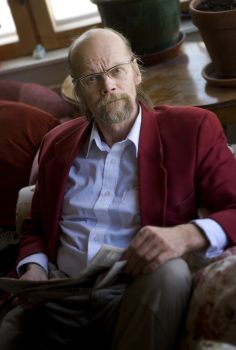Author: Risto Ahti
Words of feeling
31 March 2002 | Fiction, poetry
Poems from Vain tahallaan voi rakastaa (‘You can only love deliberately’, WSOY, 2001)
The musicians of Bremen (Self-portrait as a five animals)
People say man’s above all the other beasts.
I decided to prove that – and first turned poet
and then painfully became a flying horse, celebrating its freedom
on great shivering brawn. They captured me and put me to pulling
loads, and, seeing I endured everything docilely, they said,
He’s like the Giant Atlas, or Hanuman, the upholder of the world.
And they whipped me and sat on my back and finally
buried me alive. I became a pig and gorged my bellyful and my senses full
and it horrified people, who said: He’s a disease, an epidemic, Death itself.
And they cut my ears and blinded me and sliced my belly in two.
And I turned into a dog and learned everything I was taught and they said,
He’s completely without a will, like the angels, like an ascetic, and a prophet.
And they drove me out to wander the streets and the wildernesses. And in the desert
I turned into a tiger and people shouted in terror
What on earth
has God done – look, he’s Satan himself. And they shot me
from an elephant’s back. And I died into a cock and people woke up and shouted,
The healer of the world! And whenever I sing, because I only sing untold-to,
People wring my neck. More…
The only time for loving
Issue 4/1998 | Archives online, Fiction, poetry
Poems from Iloiset harhaopit (‘Happy heresies’, WSOY, 1998). Introduction by Herbert Lomas
Thief
Down from the top floor crept
a kind thief
and loaded a bed with silver,
nicked from a house in the harbour.
‘Ah,’, he said, like Weiss: ‘an
impecunious lot – no hope of swag.
The lady’s purse is empty, nothing but
matches, sugar, a teabag.
Too few frocks in the wardrobe too
for a pretty lady.’
Morning, and the bedside chair
is piled with frocks from the neighbour’s line.
A proper thief is smitten
and shows his philosophy of crime,
and I’m a poet!
Neither foxes nor police dogs stir my heart
but I do love the sheer out-and-out howling
dottiness of our time. More…
We’re all perfect
Issue 4/1990 | Archives online, Fiction, poetry
Poems from Laki (‘The law’, 1990)
The Law
No one’s stupid – there are
people deprived of the wise,
and those with self-respect
knocked flat. No one’s
hardened – there are people with
calloused wounds.
No one’s blind – there are
people cataracted by custom. Be different:
heal wounds and look up – wake
your dear one in mid-sleep, hug her.
(We’re all perfect.) More…
Narcissus in winter
Issue 4/1984 | Archives online, Fiction, Prose

Risto Ahti. Kuva: Harri Hinkka
Poems from Narkissos talvella (‘Narcissus in winter’, 1982). Introduction by Pertti Lassila
Risto Ahti (born 1943) published his first work in 1975. His poetic expression finds form remarkably often in prose poems, and Narkissos talvella is made up exclusively of these. His poems transmute language into a mystical, surreal world, sometimes enigmatic and subjective in the extreme, and at its best strangely suggestive. It is as if Ahti’s world were in a state of constant change, subjected to a relentless process of demolition and rebuilding. The experience of the individual, generally his encounter with truth, is central to many of Ahti’s poems; the inner reality of a person manifests itself as more essential than the outward appearance. Ahti’s poems exhibit a fruitful contradiction: on the one hand, the accuracy with which he uses words and, on the other, the continual shape-changing and lack of definite boundaries of the world they describe. More…
